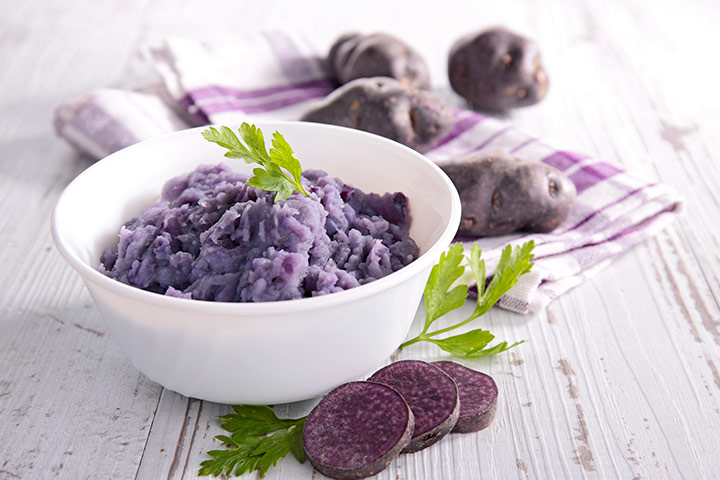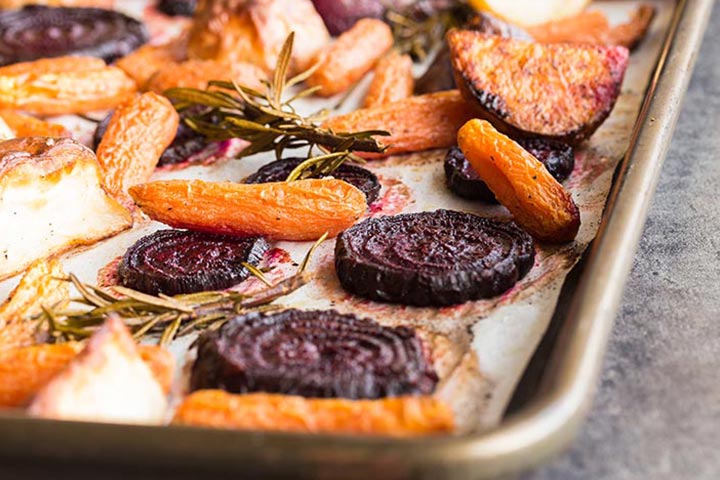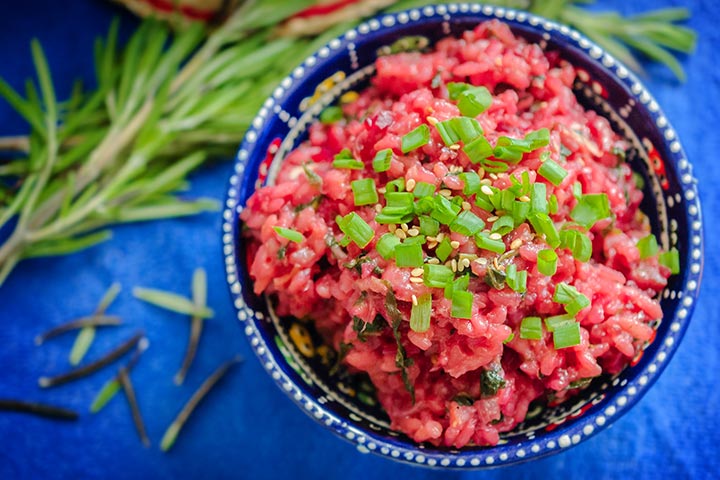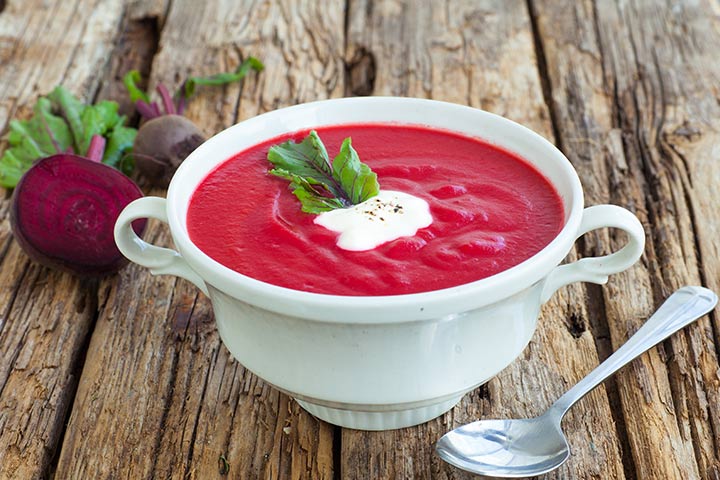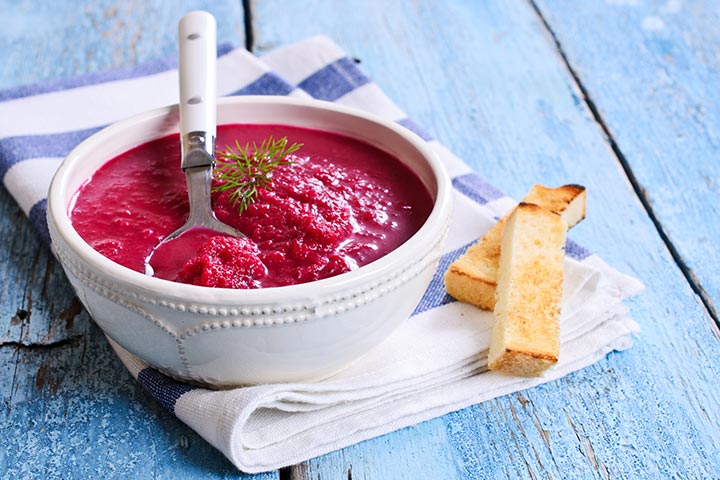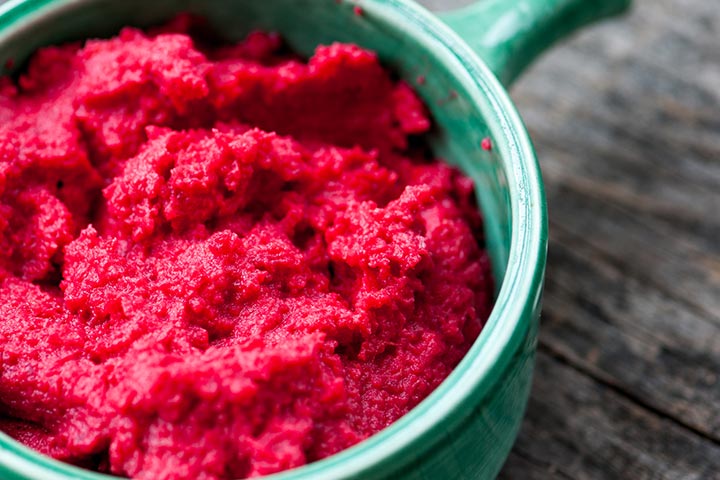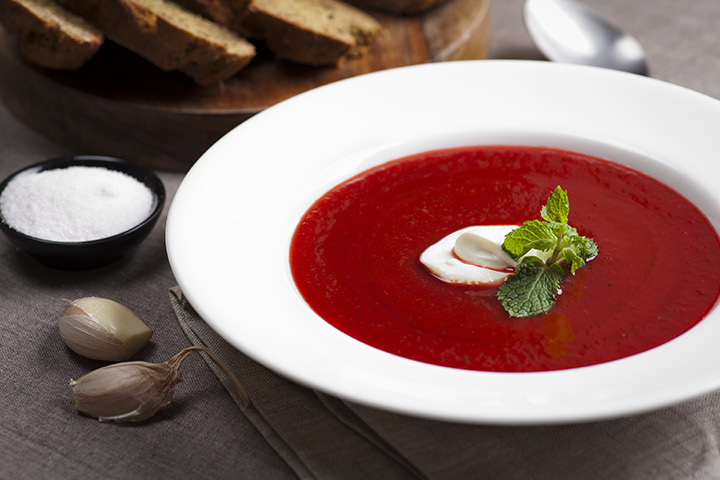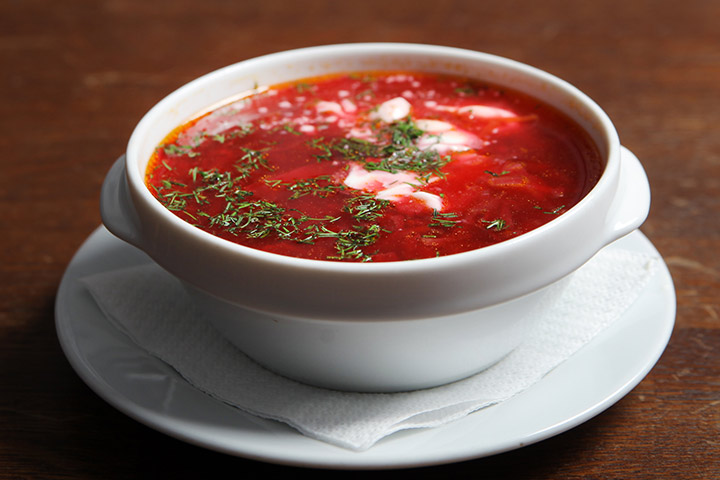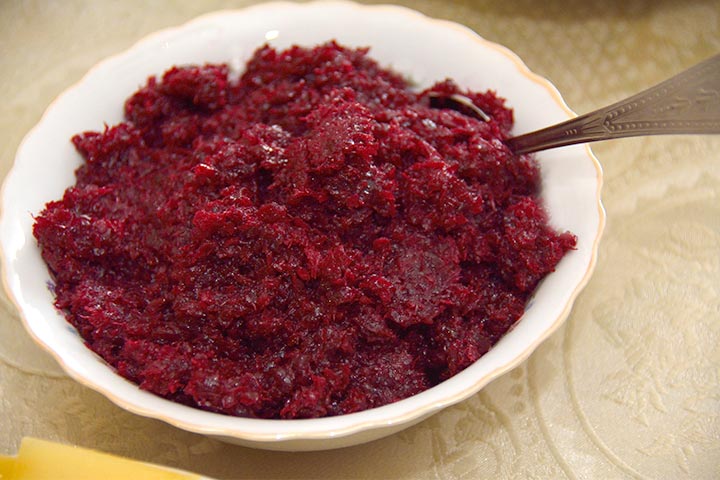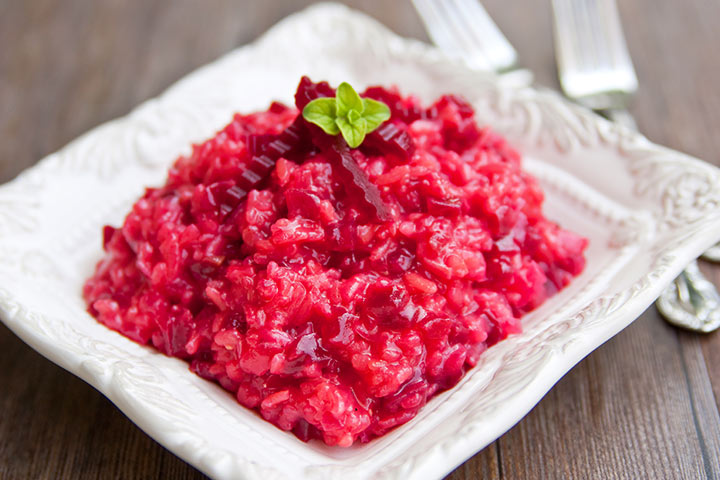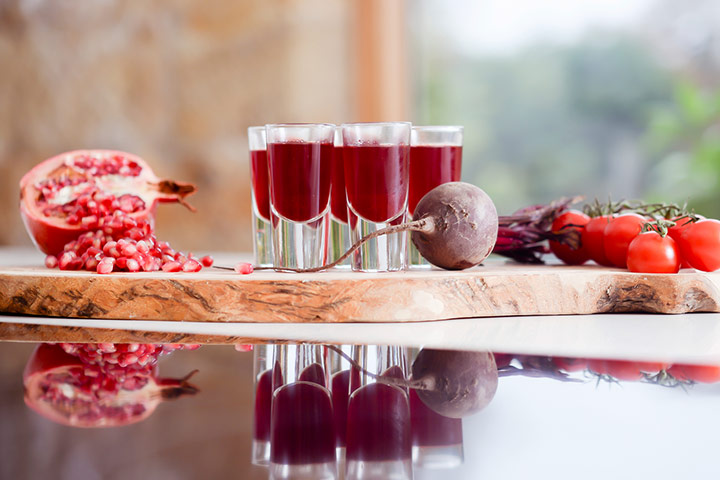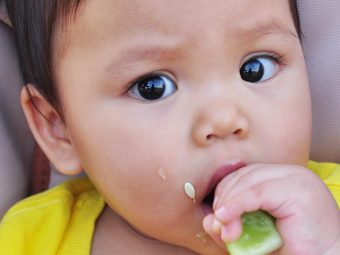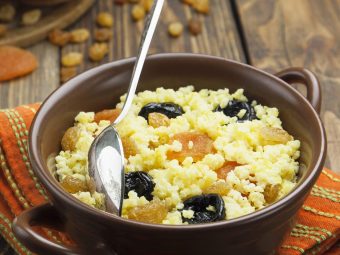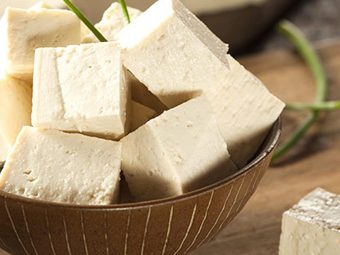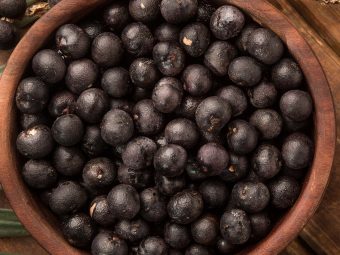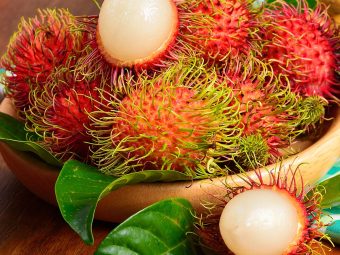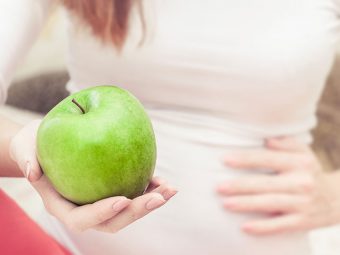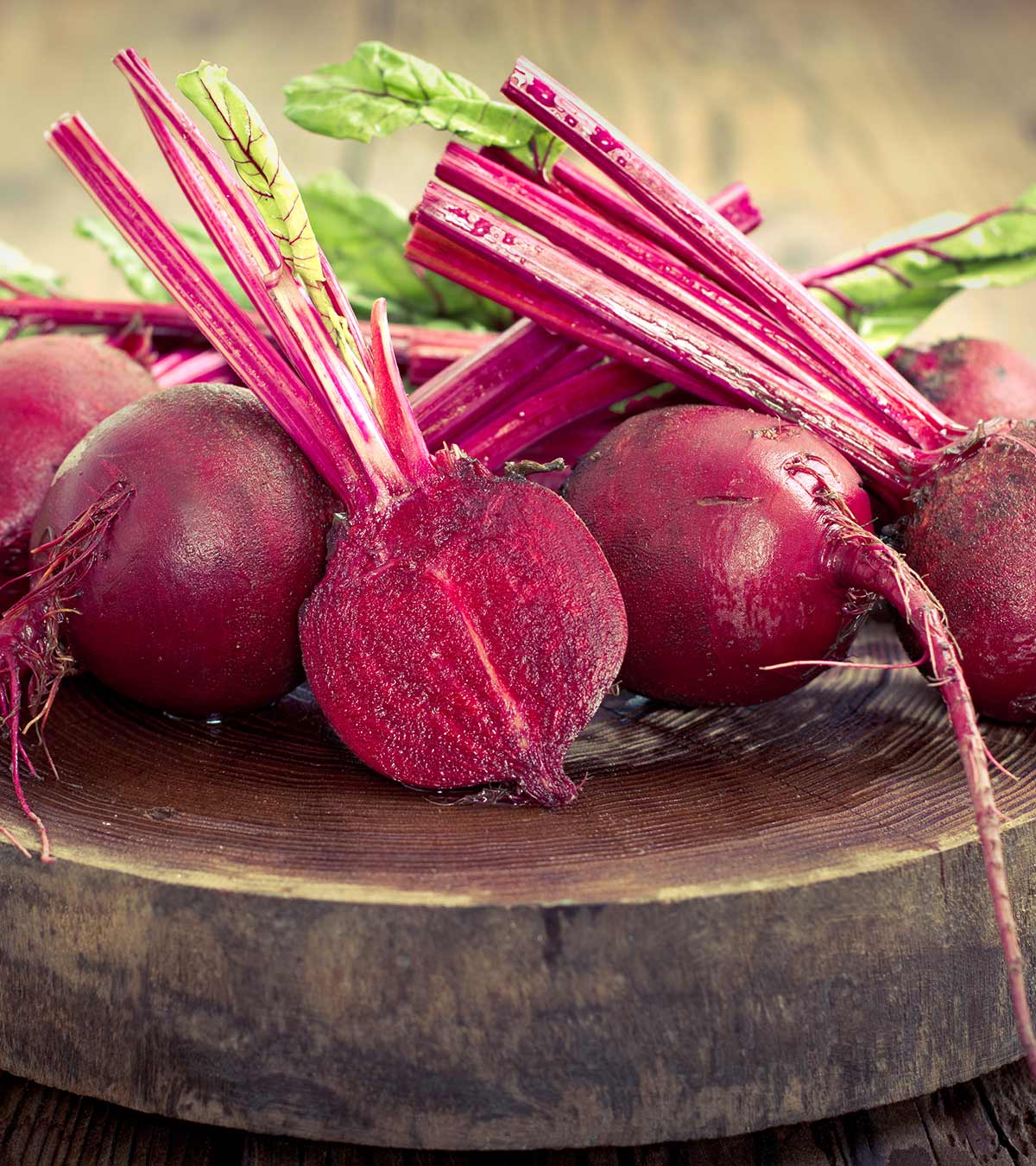
Image: Shutterstock
If your baby has been weaning off from exclusively nursing to eating solid meals, you should be happy for your baby to try different food. Beetroots for babies can be one of the good first foods to try. Read the post to learn various healthy and tasty beet recipes for babies.
When your baby begins to eat solids, you need to gradually increase the number of meals while supplementing with breastmilk or formula. You should also ensure that all recipes are baby-friendly and opt for nutritious ones amidst several food choices. This post discusses the benefits of beetroot for babies and some easy beet recipes for your baby.
Health Benefits Of Beets
The natural sweetness of beets is well preferred by babies and they can serve as great finger food too. Beets play a prominent role in imparting overall health of your baby. Here are some beetroot health benefits for babies you should know:
- Overall health: Beets may reduce the risk of developing diseases such as night blindness, glossitisiXInflammation of the tongue, causing a change in its surface and texture , beriberiiXA deficiency disorder in which the body lacks enough levels of thiamine, leading to a range of symptoms , and jaundice as they are full of minerals and vitamins such as vitamin A or beta-carotene, calcium, folateiXA component of B vitamin, required in small quantities for healthy cell growth and function , magnesium, potassium, and more (1). They also contain lipidsiXGroup of compounds that store energy, help in the production, absorption, and transport of crucial nutrients and hormones and proteins.
- Boost immunity: Antioxidants like lutein present in beets boost the immune system.
 Quick fact
Quick fact- Help digestion: Fiber-rich beets ease the digestion process. It keeps constipation at bay and soothes a troubled digestive system.
- Brain activity: As an iron-rich food, beetroot lessens the risk of anemia and aids in brain development during the early months. It promotes blood circulation in the brain and increases activity. Betaine, a substance present in beets, tends to relax the baby’s mind and enhance the little one’s mood.
- Natural cleanser: Beets act as natural cleansers especially for organs such as the gall bladder and kidneys.
Nutritional Value Of Beets
| Nutrient | Unit | Value per 100 g |
|---|---|---|
| Water | g | 87.06 |
| Energy | kcal | 43 |
| Protein | g | 1.61 |
| Total lipid (fat) | g | 0.17 |
| Carbohydrate, by difference | g | 9.56 |
| Fiber, total dietary | g | 2.8 |
| Sugars, total | g | 6.76 |
| Calcium, Ca | mg | 16 |
| Iron, Fe | mg | 0.79 |
| Magnesium, Mg | mg | 23 |
| Phosphorus, P | mg | 40 |
| Potassium, K | mg | 325 |
| Sodium, Na | mg | 78 |
| Zinc, Zn | mg | 0.35 |
| Vitamin C, total ascorbic acid | mg | 4.9 |
| Vitamin A, IU | IU | 35 |
| Vitamin E (alpha-tocopherol) | mg | 0.04 |
| Vitamin D (D2 + D3) | µg | 0 |
| Cholesterol | mg | 0 |
Source: https://fdc.nal.usda.gov/fdc-app.html#/food-details/169145/nutrients
When To Introduce Beetroot For Babies?
The ideal and recommended period to introduce beets to your baby is between eight and ten months, as they are higher in natural nitrates than other vegetables.
However, guidelines vary around the world when it comes to the introduction of beetroots. In the UK, beets are often included in babies’ diets from six months of age.
Add beets to your little one’s diet once she has had a taste of a few yellow and green vegetables. Serve not more than one to two teaspoons of beets to babies less than a year old, as nitrates cannot easily be digestible and can cause a condition called ‘baby-blue syndrome’ or methemoglobinemia. You can increase the intake after the baby turns one.
Avoid beets if your baby has diarrhea, as they have a mild laxative effect.
Consult your doctor before introducing them, if your baby suffers from gastroesophageal reflux disease (GERD).
Some pediatricians suggest not to feed fresh beet puree to babies and instead go for canned beet puree because of high nitrate levels in fresh ones. Beetroot allergy is rare. However, check with the doctor before you try it on your little one.
Note: Do not be alarmed if your baby’s poop is pink in color. It is normal after a meal containing beets.
 Point to consider
Point to considerSafety Measures To Take While Feeding Beetroots To Babies
Lisa Richards, a nutritionist from the Greater Edmonton Metropolitan Area, says, “After consulting your child’s healthcare provider and obtaining clearance to begin solids, beets can be among some of the first foods you offer to babies. It is important to start with small amounts and watch for any signs of allergic reaction. As with any new food, it is also important to introduce beets one at a time and wait a few days before introducing any additional new foods. This will allow you to identify any potential allergies or sensitivities. Always ensure you are present when they are eating and that the food is soft and small enough to prevent choking.”
When you feed your baby, having them sit in a high chair or any other safe spot is essential. Keep a close eye on what they’re putting in their mouth, and always watch them while they eat. According to the US Department of Agriculture’s Special Supplemental Nutrition Program for Women, Infants, and Children (WIC), pieces of hard raw vegetables or fruit, such as beetroot, raw carrots or apples, and uncooked dried vegetables are among the list of foods you should not include in your child’s diet to prevent choking (3).
How To Select Beets For Homemade Baby Food?
Beets are available all through the year, while the peak season is June through October. They do not fall under the ‘dirty dozen’ foods contaminated with pesticides. But if desired, you can purchase organic beets.
Pick fresh ones for homemade baby food. Select medium-sized beets over large beets as they are more tender and tasty. Opt for beets that are less than three to four-inch diameter, unblemished, unbroken, or unbruised. Go for beets with green, leafy tops (whenever possible). Wash the beets thoroughly before use.
How To Store Beets?
Store beets in a refrigerator after removing the leaf tops. Put them in a freezer bag or an airtight container and place in the veggie crisper or far back of the fridge. They remain fresh for a week, if stored well.
How To Cut Beetroots For Baby-led Weaning?
For feeding your baby this nutritious and colorful vegetable, you should ensure it is cut in appropriate sizes to make it easier for them to eat. You should peel the beetroot and cut it into tiny lengths to easily smash it while your baby transitions from breast milk to solid food.
How To Cook Beets For A Baby?
The best method to cook beets for babies is by steaming or boiling. Baking is also an easy way to cook beets. Steamed beets are easier to make into puree and have Vitamin A beta carotene readily available to be absorbed by the baby’s body. Cooking can significantly reduce the nitrates in raw beets.
Rinse the beets thoroughly, remove greens, peel the skin (or peel the skin after cooking) and dice it into small pieces. Then start cooking:
- Boil water in a medium saucepan.
- Add beet slices and cook them until tender (for nearly 15 minutes).
- Drain the beets. To stop the cooking process, rinse them under cold water.
- Puree the cooked beets in a blender until smooth. Add water if required.
If you prefer to bake the beets, just wrap the slices in foil and cook for an hour at 360ºF or 180ºC.
Serve beet purees mixed with raisins, applesauce, sweet potatoes, chicken, brown rice, etc. Typically around ten months, your baby will be ready for finger foods, and then you may serve small cooked pieces of beets.
You may refrigerate beet puree leftovers for three days in BPA-free containers. However, it is advisable to give freshly prepared food to babies.
Discard the cooking water from boiling beetroot as nitrates may have got into the water during the cooking process.
Quick Beetroot Recipes For Babies
Some of the quick beetroot recipes are discussed below. Have fun while you try them out for your baby.
1. Purple Potatoes
You will need:
- 2 medium sized beets
- 1 medium sized carrot
- 2 potatoes
- water
How to:
- Wash and peel the carrot, beets, and potatoes. Cut them into slices.
- Steam or boil them in water until tender. Once cooked, make a smooth Puréed food out of it in a food processor. Add salt for taste.
2. Roasted Beet Shapes
You will need:
- 5 beets (medium sized)
- 1 tbsp olive oil
How to:
- Clean the beets, peel, and slice them.
- Brush olive oil on the beet slices and put them on a baking sheet.
- Bake them at 350ºC for around ten to 20 minutes.
- Sprinkle a pinch of salt before serving.
 Quick tip
Quick tip3. Beetroot Rice Casserole
You will need:
- 2 cups beets slices (cooked)
- 3 cups brown rice (cooked)
- 1 small onion (optional)
- 1 cup shredded chicken (cooked)
- 1/2 cup chicken broth
- 1/4 cup whole milk or yogurt
- 3 egg yolk
- Spices if needed
How to:
- Mix rice, beets, onion, chicken in a bowl. Add milk and egg yolks.
- Apply olive oil or cooking spray in a two-quart casserole dish and evenly spread the mixture in a dish.
- Bake for one hour at 350º.
4. Mashed Turnip & Beets
You will need:
- 1 large turnip (diced)
- 4 beets
- spices (for taste/ optional)
How to:
- Put the beet in a pan containing boiling water and cover.
- Steam the beets until tender and place the both in a bowl and mash. Add spices if desired.
5. Beetroot Soup for Babies
You will need:
- 3 beets (peeled and diced)
- 1 potato (diced)
- 1 small onion (chopped/optional)
- 16 fl oz (2 cups) homemade vegetable broth/stock.
- 2oz (1/4 cup) yogurt
How to:
- Add all the ingredients in a saucepan (except yogurt). Add water and bring to a boil.
- Allow the veggies to cook until they turn tender and make a puree later.
- Add in fresh yogurt and serve.
6. Gourmet Beet Puree
You will need:
- 2 beets (cooked)
- 1/2 small onion (chopped/ optional)
- ground nutmeg (pinch)
- 2 tbsp homemade applesauce
How to:
- Add oil in a pan. Saute onions until tender.
- Add beets, onion, applesauce, and nutmeg into a blender to make a puree.
Note: Cooked carrots can be used instead of onion in your baby food recipes if you do not want to add them.
7. Cheesy Beet Bites
You will need:
- 1 bread slice
- 1/4 cup cooked beetroot slices
- 1 tsp cheese
How to:
- Toast a bread piece. Cover with a layer of cooked beetroot slices.
- Top with cheese and grill.
8. Baby’s Beetroot Mash
You will need:
- 2 beetroot (peeled and chopped)
- 1 apple (peeled and chopped)
- 1 potato (peeled and chopped)
How to:
- Steam all three ingredients until tender (add apple at the end).
- Mash the ingredients to make the beetroot puree for your baby.
 Quick tip
Quick tip9. Carrot Beetroot Puree
You will need:
- 1/2 cup carrot (chopped)
- 1/2 cup Beetroot (peeled and chopped)
How to:
- Cook carrot and beetroot in water. Add salt for taste.
- Blend them together to make a puree.
10. Beetroot Carrot Soup
You will need:
- 1/2 cup carrot (chopped)
- 1/4 cup Beetroot (peeled and chopped)
- 1 cup water
How to:
- Add carrot, beetroot, and water into a pressure cooker. Mix well and cook for two whistles.
- Allow it to cool and blend until smooth. Strain the mixture with the help of a strainer.
- Transfer the mixture to a pan and boil. Keep stirring intermittently. Cool and serve.
11. Apple Beetroot porridge
You will need:
- 1 beetroot (peeled, grated)
- 1 apple (grated)
- little fresh ginger (grated)
- ¼ cup oats
- ½ cup milk
How to:
- Mix all the ingredients in a pan and cook for five minutes.
- Keep stirring until the veggies turn soft. Add more milk to the beetroot porridge if needed.
12. Beetroot Halwa with Dates
You will need:
- 1 beetroot (peeled, chopped)
- 10 dates
- 2 tsp ghee
- water
How to:
- Cook the beetroots in a steamer or pressure cooker with water.
- Take away the seeds from dates and cook in water until they turn soft. This may take about five minutes.
- Blend the cooked beets and dates together.
- Pour ghee in a pan, heat it and add the mixture to this.
- Saute till the raw smell vanishes and cover the pan for around 10 minutes.
- Stir occasionally. Put off the flame when it turns thick.
Note: Offer not more than three spoons for babies. Add formula or breast milk to get the desired consistency.
13. Beetroot Risotto
You will need:
- 1/2 onion (chopped)
- 1/2 garlic clove (finely chopped)
- 125g risotto rice (cooked)
- 2tbsp olive oil
- 250g fresh beetroot (cooked)
- 425ml vegetable stock
- 1tbsp grated parmesan cheese
- 2tbsp cream cheese
How to:
- Preheat the oven at 180ºC.
- Heat the olive oil in a pan, add garlic and onion and cook for five minutes.
- Add rice to the pan and stir well. Pour half the stock and let it cook for five minutes.
- Pour remaining stock, stir, and place in the oven. Cook for 15 minutes.
- Make the beetroot puree. Stir in cream, parmesan, and beet puree to the risotto.
- Whizz once again to make a puree.
14. Pomegranate and Beetroot juice
You will need:
- 1 beetroot (peeled, cut, steamed)
- 1 bowl pomegranate seeds
How to:
- Blend steamed beetroots and pomegranate seeds in a blender.
- Strain through a fine sieve before serving. .
Frequently Asked Questions
1. Does beetroot cause constipation in babies?
No. Beetroots help promote digestion and benefit the baby’s overall digestive health, decreasing the chances of constipation.
2. Do beets cause gas in babies?
There is no conclusive evidence that indicates beetroots can cause gas in babies.
3. Can beetroot cause black stool in babies?
The food a baby eats can affect their poop color. The consumption of beetroot may lead to a dark or blackish stool in babies, and it is nothing to worry about. However, if the poop appears black even when the baby hasn’t eaten beetroot, and the baby shows signs of discomfort, consult a pediatrician.
4. Can beetroot be given to babies with acid reflux?
There is no evidence that beetroot can exacerbate acid reflux. You may serve the vegetable to your baby and observe for any signs of worsening reflux. If you notice any problems, stop feeding the vegetable.
5. Can beetroot be given to babies with a family history of asthma?
There are no contraindications to feeding beetroot to children with asthma. Nevertheless, consult your baby’s doctor, especially if your baby has asthma and has shown signs of food allergy in the past.
6. Can beetroot be given to babies with a family history of heart and blood pressure problems?
Beetroot is not prohibited for those with heart and blood pressure problems. Nevertheless, check with your baby’s doctor first before introducing the vegetable.
7. Can beetroot be given to babies with a family history of diabetes?
Beetroot is generally safe to consume for those with diabetes. If you are unsure how your baby may respond to it or your baby is on diabetes medication, speak to a pediatrician first.
Beetroot is a highly nutritious vegetable that you can safely include in your baby’s diet. Due to its nutrition profile, beetroot offers numerous health benefits, such as improved immunity and digestion. So if you’re introducing solid food to your baby, go ahead and try these delicious and easy recipes of beetroot for babies. Serve it as a snack to curb their hunger pangs or as filling meals. However, ensure not to exceed the recommended amount per day and consult your child’s doctor in case of any adverse reactions.
Infographic: Health Benefits Of Beets
It is well-known that beets are a rich source of iron and help improve the blood levels in our bodies. They are equally beneficial to babies. The infographic below highlights the potential benefits of including beets in your baby’s diet. So, save and share it with other parents too! Illustration: Momjunction Design Team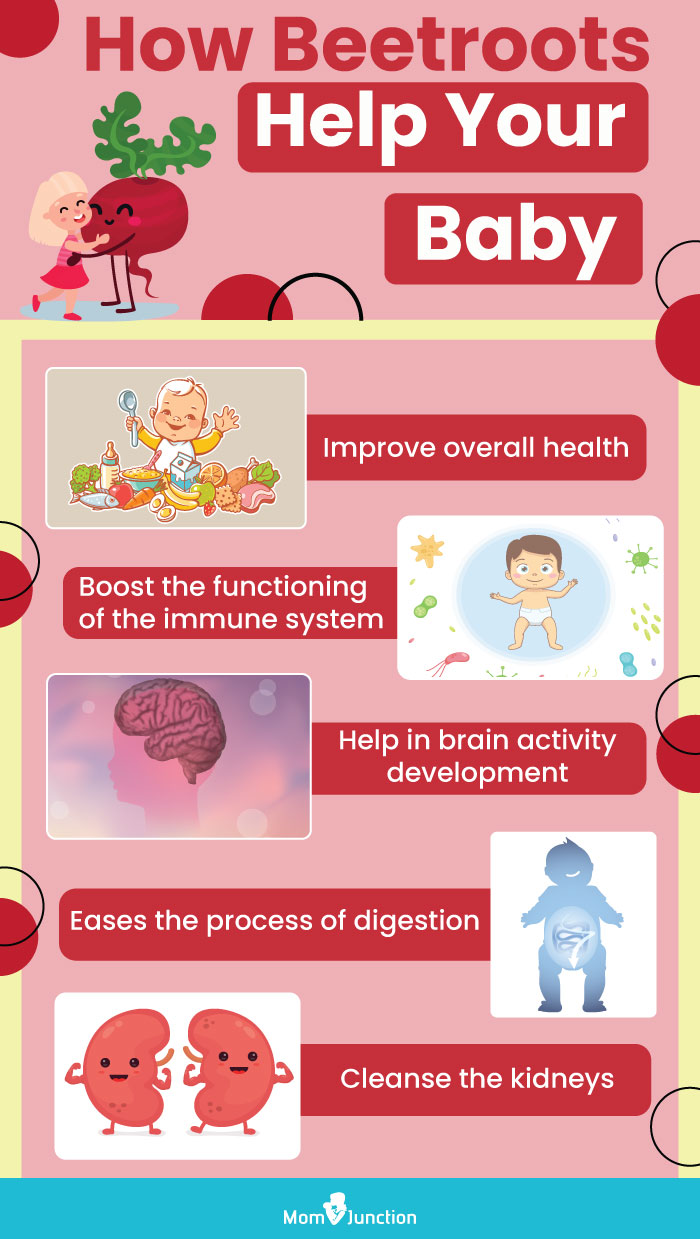
Key Pointers
- Beets are a good choice of finger foods for babies as they help boost immunity and digestion.
- Parents can introduce beets to babies when they are about eight to ten months old.
- Beetroots are also known to help develop brain functioning as they are a rich source of iron.
- You can either mash the beetroots or prepare casseroles with them for your baby.
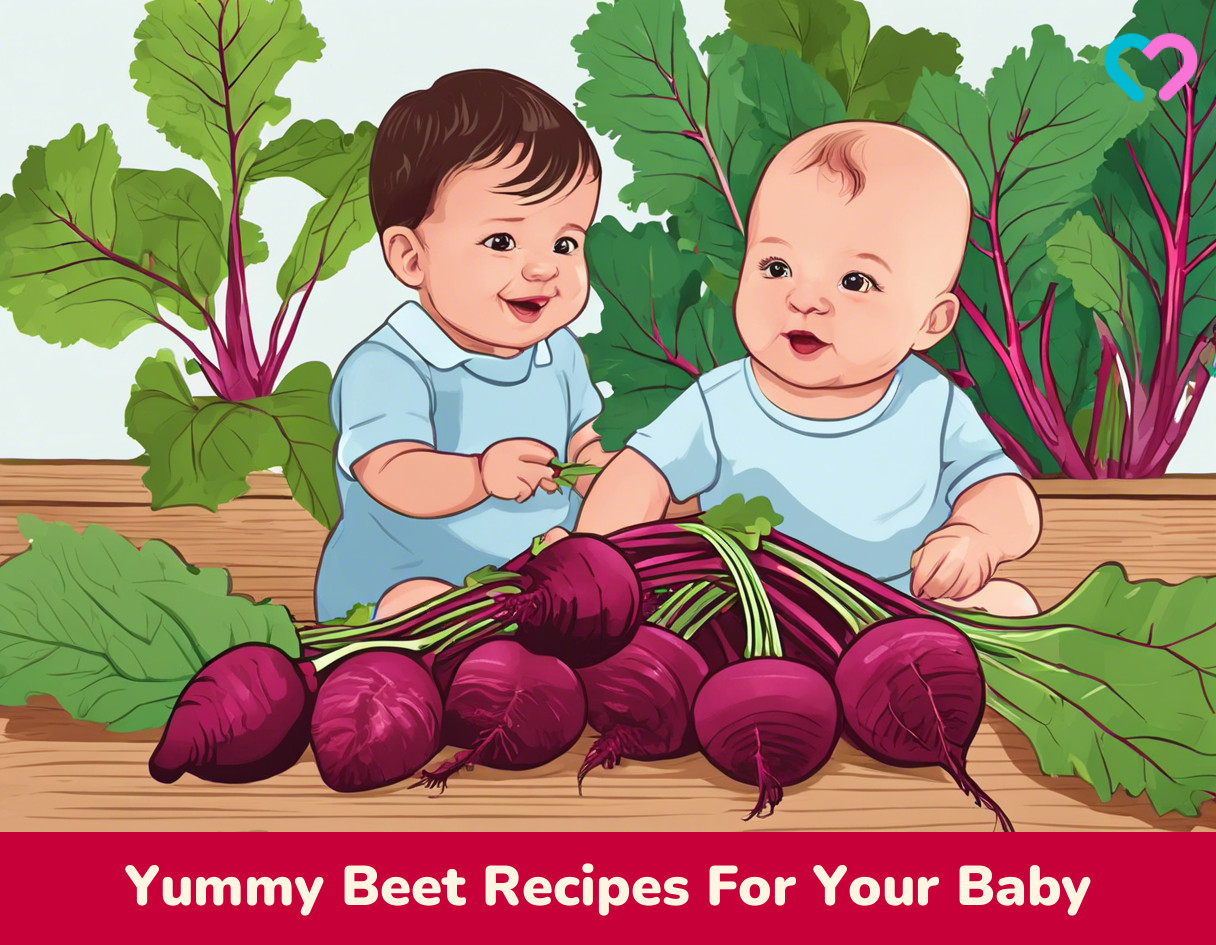
Image: Stable Diffusion/MomJunction Design Team
References
- 10 Healthy Reasons to Brighten Your Meals with Beets.
https://foodrevolution.org/blog/benefits-of-beets/ - 5 Health Benefits of Beets.
https://health.clevelandclinic.org/the-health-benefits-of-beets/ - Choking Hazards
https://www.cdc.gov/nutrition/infantandtoddlernutrition/foods-and-drinks/choking-hazards.html





